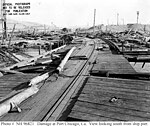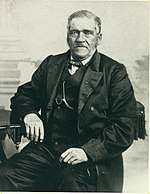Port Chicago, California
1969 disestablishments in CaliforniaFormer populated places in CaliforniaFormer settlements in Contra Costa County, CaliforniaMilitary history of CaliforniaMilitary in the San Francisco Bay Area ... and 1 more
Populated places disestablished in 1969

Port Chicago was a town on the southern banks of Suisun Bay, in Contra Costa County, California. It was located 6.5 miles (10 km) east-northeast of Martinez, at an elevation of 13 feet (4 m). It is best known as the site of a devastating explosion at its Naval Munitions Depot during World War II.
Excerpt from the Wikipedia article Port Chicago, California (License: CC BY-SA 3.0, Authors, Images).Port Chicago, California
Main Street,
Geographical coordinates (GPS) Address Nearby Places Show on map
Geographical coordinates (GPS)
| Latitude | Longitude |
|---|---|
| N 38.046111111111 ° | E -122.02083333333 ° |
Address
Main Street
Main Street
California, United States
Open on Google Maps








